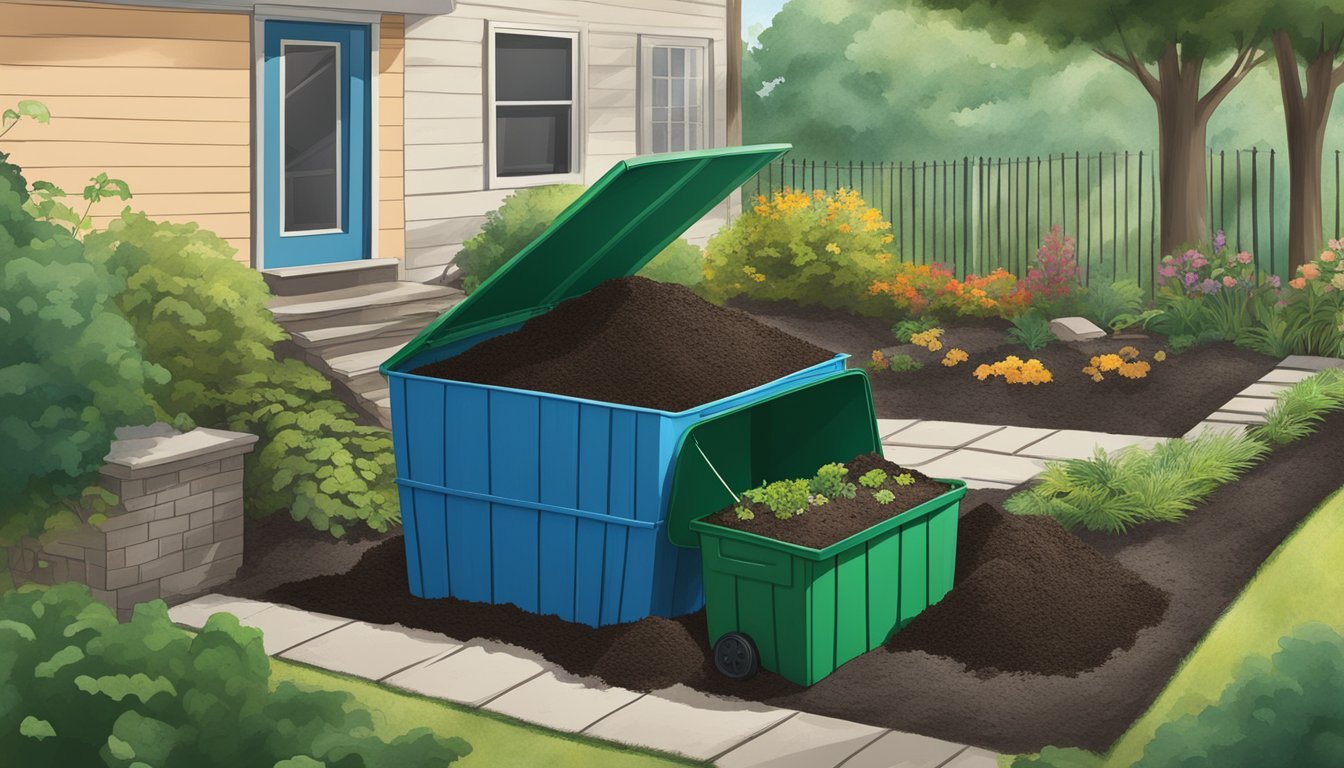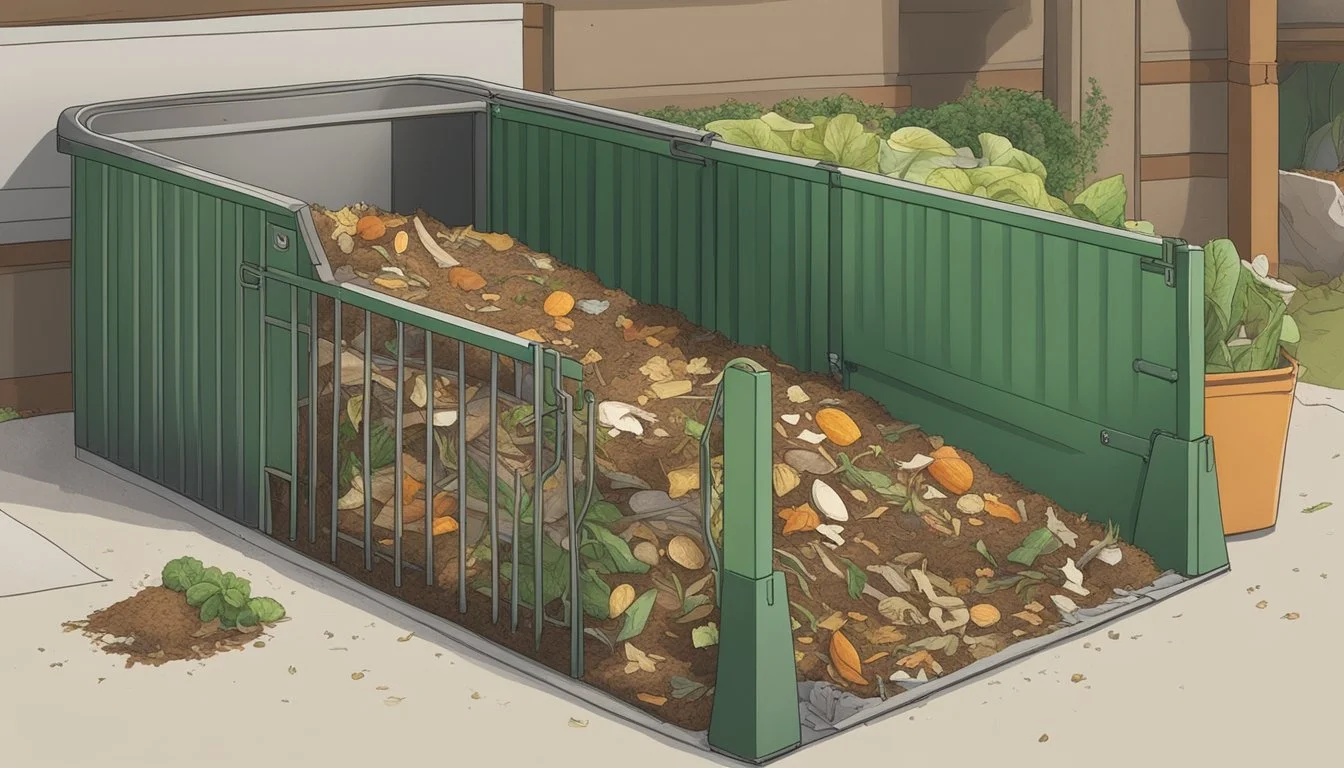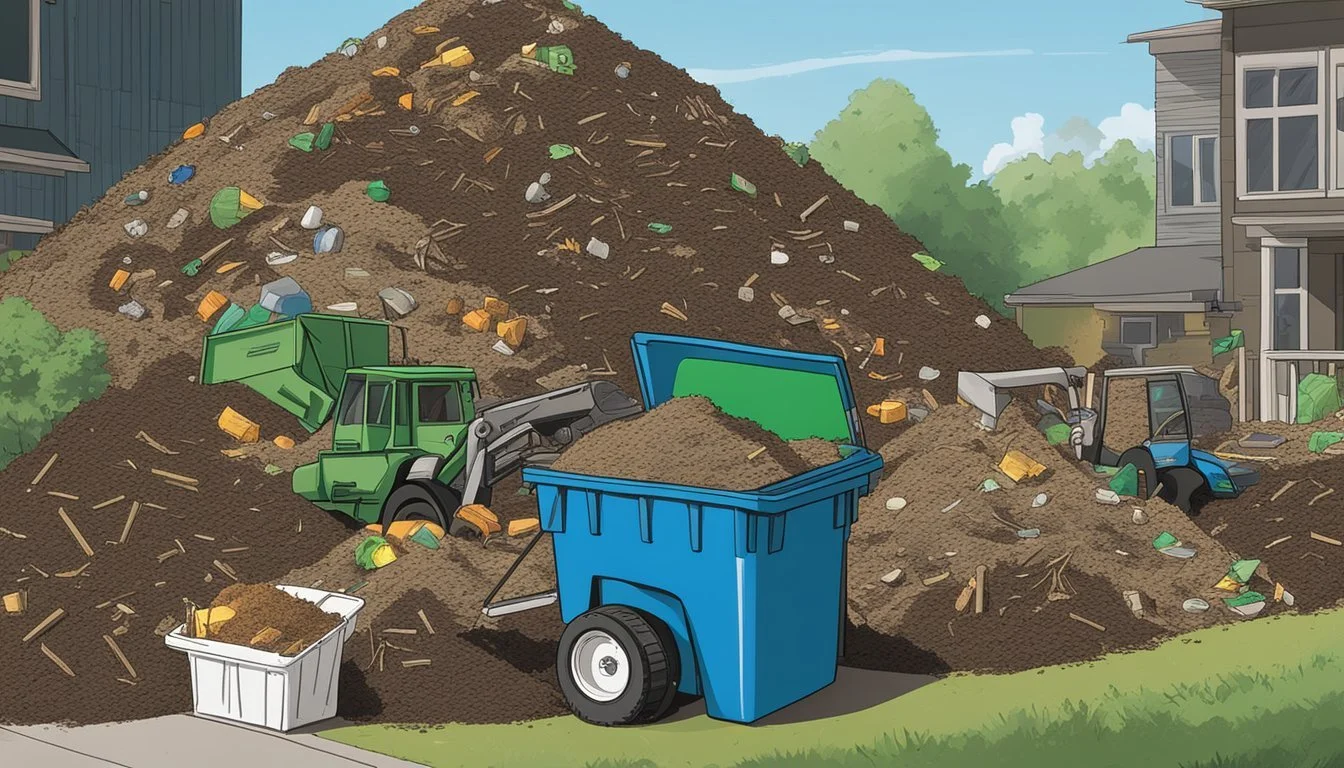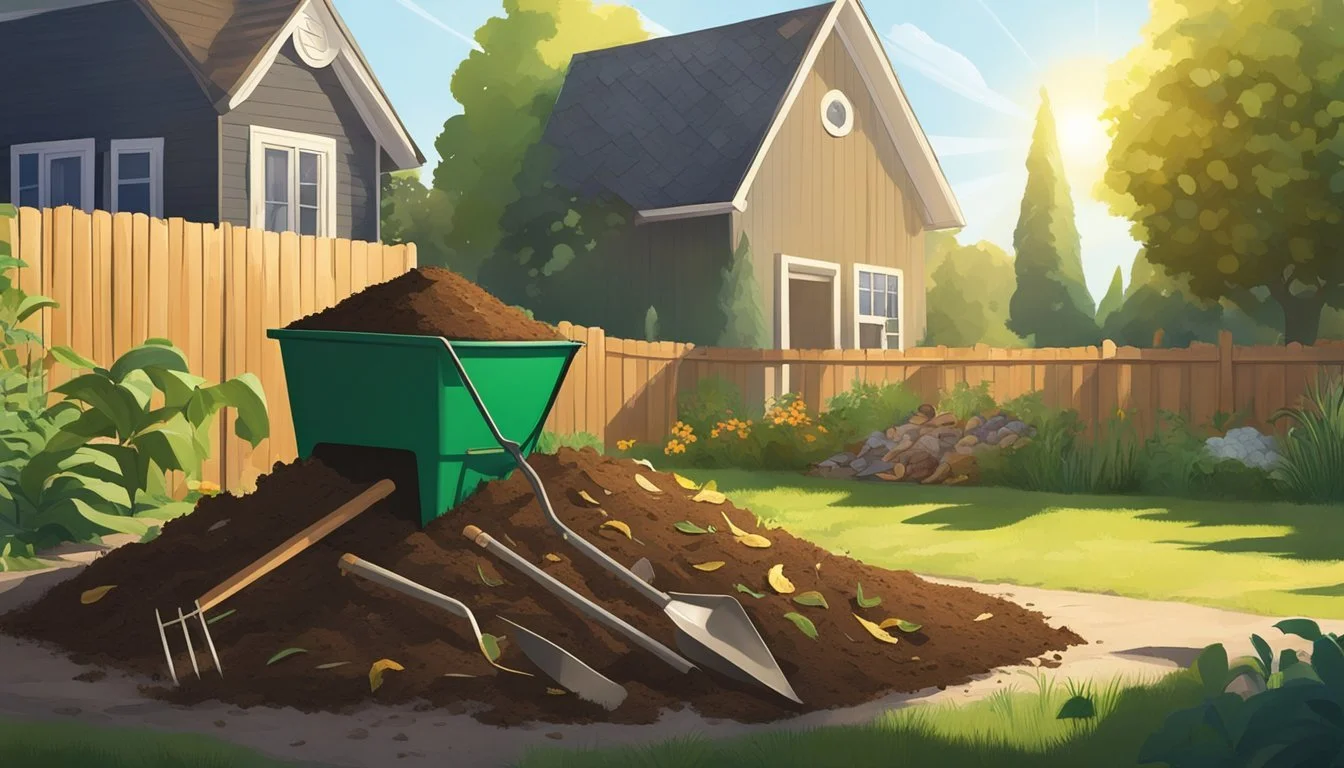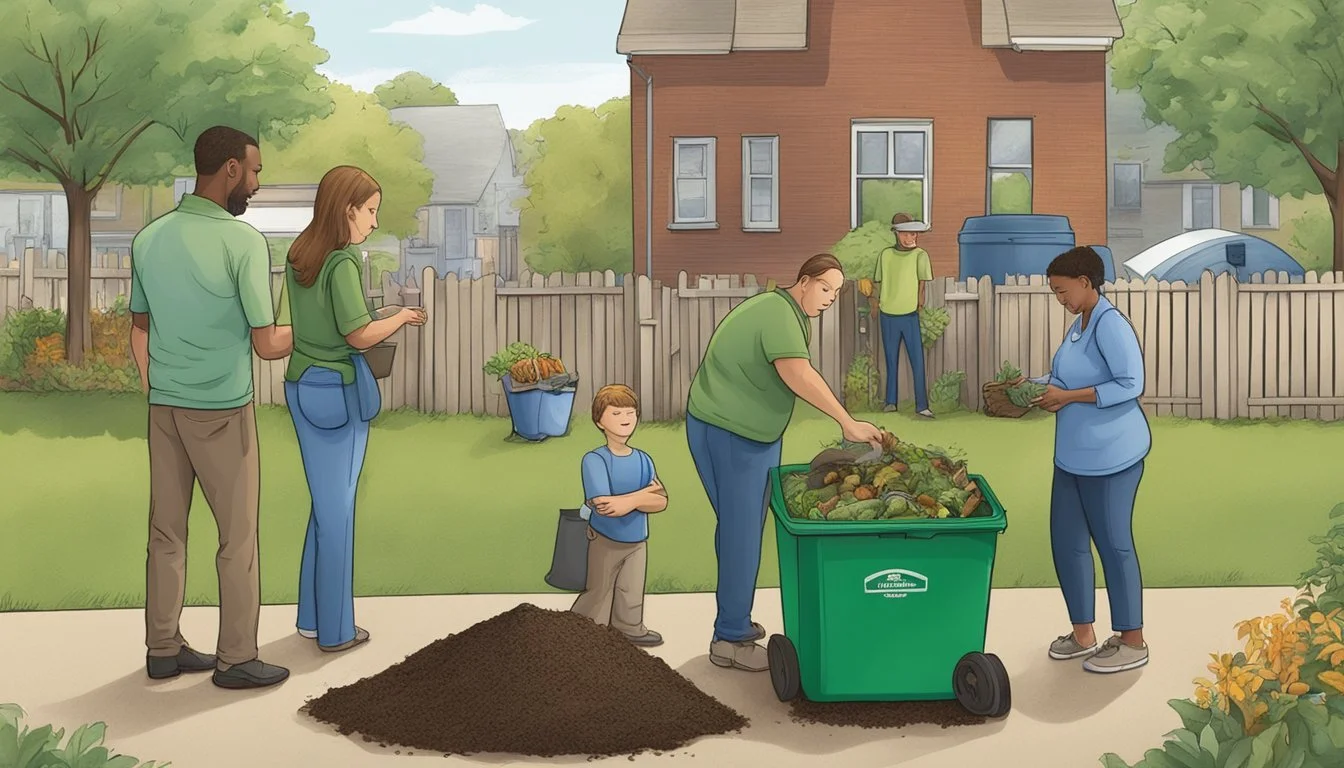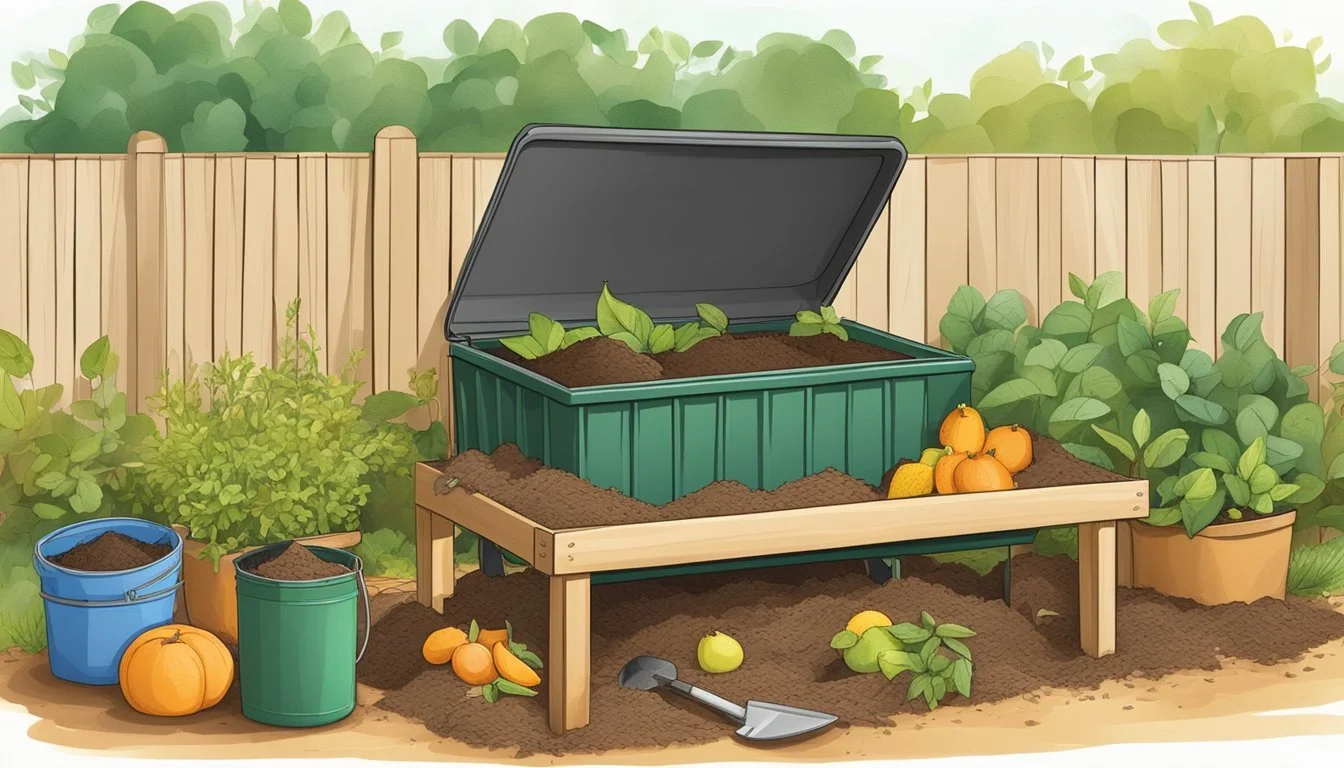Guide to Composting in Allentown, PA
Essential Tips for Local Residents
Composting is an eco-friendly process that converts organic matter, such as kitchen scraps and yard waste, into valuable fertilizer, enhancing soil health and reducing our ecological footprint. In Allentown, PA, residents have access to various resources that make composting an achievable and beneficial practice for both individual homeowners and the community at large. By turning organic waste into compost, not only does one contribute to soil regeneration, but it also helps in reducing the amount of waste sent to landfills.
The City of Allentown promotes sustainable waste management practices, encouraging its citizens to participate in composting by providing community resources, information, and services to facilitate the process. Allentown's solid waste management includes municipally owned composting facilities where residents can drop off suitable materials. For those without the space for a traditional backyard compost pile, local organizations offer insights on indoor and small-space options, ensuring that every resident has the opportunity to contribute to a greener environment.
Engaging in composting activities supports Allentown's commitment to sustainability and provides residents with a hands-on way to enrich their gardens and landscapes. As the practice continues to gain traction, Allentown serves as a model for other Pennsylvania communities looking to incorporate greener habits into their daily lives. With a wealth of local knowledge and support systems, including guidance from the Lehigh Valley Sustainability Network, anyone in Allentown can start composting and join the movement towards a more sustainable future.
Benefits of Composting
Composting provides tangible benefits, from enhancing soil health to reducing waste and lessening environmental impact, particularly in a community-focused setting such as Allentown, PA.
Soil Enrichment
Composting generates nutrient-rich humus that significantly enriches soil quality. This humus supplies essential nutrients to the soil, promoting healthier plant growth. Composting converts organic material into a form that plants can easily uptake, fostering a robust soil ecosystem.
Primary Nutrients Added to Soil:
Nitrogen
Phosphorus
Potassium
Waste Reduction
By composting, Allentown residents can divert a substantial amount of organic matter from landfills. This not only extends landfill space but also reduces methane emissions from decomposing waste, which is a potent greenhouse gas.
Organic Materials Suitable for Composting:
Leaves
Grass clippings
Food scraps
Environmental Impact
Composting has a sustainable, positive effect on the environment. It reduces the dependency on chemical fertilizers and helps sequester carbon in the soil, combating climate change. Moreover, it diminishes the energy and emissions associated with hauling waste to landfills.
Benefits to the Environment:
Reduces greenhouse gases
Lowers chemical fertilizer use
Enhances water retention in soil
Understanding Composting Basics
Composting transforms organic materials such as food scraps and yard waste into a rich soil amendment through a natural decomposition process. This section aims to explain the fundamental components and steps involved in creating compost, as well as how to balance materials to ensure efficient decomposition.
Compost Composition
Compost is created from organic materials that are categorized into two primary types: carbon-rich materials and nitrogen-rich materials. Carbon-rich materials, often referred to as "browns," include dried leaves, branches, and paper. Nitrogen-rich materials, or "greens," consist of food scraps, grass clippings, and coffee grounds. For successful compost, there must be a proper balance of these components.
Browns (Carbon): Sawdust, cardboard, twigs
Greens (Nitrogen): Vegetable scraps, grass clippings, coffee grounds
The Composting Process
The composting process involves four key elements: organic materials, microbes, air, and water. Microbes break down organic waste, turning it into compost with the help of optimal moisture and aeration. This biological activity generates heat, which helps to accelerate decomposition while reducing harmful greenhouse gases.
Collection: Gather organic materials.
Layering: Alternate between greens and browns.
Maintenance: Regularly turn the pile to incorporate air and monitor moisture levels.
Maturation: Allow the compost to mature until it becomes dark, crumbly, and earthy in smell.
Balancing Greens and Browns
A successful compost pile requires a balance of carbon (browns) and nitrogen (greens) materials, as well as adequate water and oxygen to support the microbes responsible for decomposition. The ideal ratio is about 3 parts browns to 1 part greens by volume.
Adequate Carbon: Absorbs excess moisture, reduces odors, promotes air circulation
Sufficient Nitrogen: Feeds the decomposing microbes
Proper Aeration: Introduces oxygen, which is critical for microbes
Moisture Control: Should be as wet as a wrung-out sponge for optimal microbial activity
Setting Up Your Compost Pile
Creating a compost pile is an effective way to repurpose organic waste into nutrient-rich amendment for gardens in Allentown. Proper setup is crucial for optimal decomposition and to support the microorganisms and worms that break down the material.
Selecting a Location
Choosing the right location for your compost bin is critical. It should be situated in a convenient yet out-of-the-way part of your backyard. An ideal spot is flat, well-drained, and has good access to water. It should also be partially shaded to retain moisture without becoming too cold, which can slow down the composting process.
Choosing the Right Bin
A compost bin serves as a container for your organic waste, where it will decompose over time. Look for bins that allow for airflow and drainage, both of which are necessary to support the microorganisms. Bins come in various sizes, so choose one that fits your available space and the amount of organic material you'll be composting. Some popular bin materials include plastic, wood, and metal.
Building the Compost Pile
Initiating your compost pile involves layering different types of organic waste. Start by placing a layer of coarse materials like straw or twigs, which aids in drainage and aeration. Then add layers of green materials such as grass clippings and vegetable scraps, which are rich in nitrogen. Alternate these with brown materials like dry leaves and newspaper, which provide carbon. Maintain a balance to foster the activity of microorganisms and worms, and turn the pile regularly to ensure even decomposition.
Maintaining Your Compost
Maintaining a compost pile effectively requires close attention to moisture levels, aeration practices, and temperature conditions. Recognizing and solving common issues promptly can ensure the efficient decomposition of organic material into valuable compost.
Moisture and Aeration
The compost pile should maintain a moisture level comparable to a wrung-out sponge. This balance is crucial for microorganisms to thrive and break down organic matter. One should turn the compost heap regularly to prevent waterlogged conditions and ensure even aeration. An adequately aerated pile promotes quick decomposition and minimizes odors.
Check Moisture Levels:
Squeeze a handful of compost – It should feel moist but not drip water.
Add dry materials such as straw or leaves to soak up excess moisture.
If the pile is too dry, add water gradually while turning the compost.
Aerate the Pile:
Turn the compost with a garden fork or compost aerator tool every 1–2 weeks.
Ensure that materials in the center are brought to the outside and vice versa.
Temperature Monitoring
Monitoring the temperature inside the compost pile is essential for maintaining the pace of decomposition. A compost pile that is performing optimally will generate heat, with temperatures often reaching between 90°F and 140°F. This heat is a clear indicator that the microorganisms are at work.
Temperature Checks:
Use a compost thermometer to check the pile's core temperature.
Typical range: 90°F to 140°F for active decomposition.
Fluctuations outside this range require adjustments in moisture and aeration.
Troubleshooting Common Issues
Compost piles might encounter several common issues, but these can often be resolved with simple adjustments.
Odor Issues:
Ammonia smell: Too much nitrogen; add carbon-rich materials like dried leaves or cardboard.
Rotting smell: Insufficient aeration; turn the pile more frequently.
Pests:
Keep the compost covered with a layer of soil or finished compost to deter pests.
Avoid adding meat, bones, dairy, or oily foods that attract rodents or flies.
In maintaining a compost pile, it is crucial to strike the right balance of water, air, and temperature. Precise management results in the successful transformation of waste into a nutrient-rich amendment for the garden, and taking proactive measures to troubleshoot common problems will help keep the composting process on track.
Composting Regulations in Lehigh County
In Lehigh County, composting is supported through clear regulations and the provision of municipally owned facilities. These regulations ensure the environmentally responsible handling of organic waste, promoting sustainability within the Lehigh Valley.
Local Guidelines
Lehigh County residents are encouraged to pursue backyard composting as an effective method of recycling organic waste like leaves, grass, and food scraps. Guidelines set forth by the county highlight the need for proper composition and maintenance of compost piles to avoid nuisances and to ensure efficient decomposition. Knowledge of these guidelines is crucial for residents to contribute to the area's sustainability goals.
Use of Public Facilities
For those without the space for backyard composting, Lehigh County provides municipally owned facilities where organic waste can be dropped off. These facilities operate by stringent regulations to oversee and facilitate the composting process. Availability and usage policies for these sites can vary, and residents are advised to stay informed through local news releases and official communications from Lehigh County offices.
Using Finished Compost
Finished compost, often referred to as “black gold” by gardeners, serves as a nutrient-rich soil additive that improves plant growth and revitalizes garden soil. When properly applied, it acts as an excellent soil conditioner, enhancing the structure and fertility of the soil.
In Gardens and Landscaping
In the realm of gardens and landscaping, finished compost plays a critical role. It can be spread as a layer on top of garden soil to serve as mulch, which helps to retain soil moisture and suppress weeds. When integrated into flower beds or vegetable gardens, finished compost significantly improves soil aeration and drainage, creating a fertile environment that encourages robust plant growth.
How to apply:
As mulch: Distribute a 2-3 inch layer over the soil surface.
For planting: Mix equal parts compost and existing garden soil.
As a Soil Amendment
Using finished compost as a soil amendment is highly valuable in amending garden soil and pots. Its integration increases soil's organic matter content, making it more nutrient-rich and fostering healthier plant growth. It is particularly beneficial when starting a new garden plot or when revitalizing a tired soil that has been depleted over time.
Application tips:
For new beds: Combine 1 part compost to 2 parts soil.
To rejuvenate soil: Work a 4-6 inch layer of compost into the existing soil.
By following these specific practices, Allentown residents can effectively use finished compost to enhance their gardens and contribute to a more sustainable environment.
Advanced Composting Techniques
Exploring advanced composting techniques can significantly improve the efficiency and effectiveness of composting efforts in Allentown, PA. These methods utilize specialized processes and conditions to accelerate decomposition and enhance compost quality.
Vermicomposting
Vermicomposting involves the use of certain species of worms like red wigglers to break down organic matter. This process is highly efficient, relying on the natural digestive abilities of the worms to create nutrient-rich compost. Worms consume kitchen scraps, paper, and yard waste, leaving behind castings that serve as a powerful fertilizer.
Key aspects to consider:
Ideal Conditions: Maintain a balanced moisture level and temperature range of 55-77°F (13-25°C).
Materials: Feed worms fruit and vegetable scraps, eggshells, coffee grounds, and small amounts of yard waste.
Bokashi
Bokashi composting is a fermentation process that uses a mix of microorganisms to break down organic material in an anaerobic environment. This method is suitable for handling meat and dairy products, which are typically problematic in traditional composting.
Important points to note:
Bokashi Bran: Add this mixture rich in beneficial bacteria and fungi to start the fermentation.
Air-Tight Containers: Seal waste with Bokashi bran in a container to create an oxygen-free environment.
Hot Composting
Hot composting is a technique where a large volume of organic material is decomposed at high temperatures by thermophilic microorganisms and bacteria. This process creates heat, which can destroy weed seeds and pathogens faster than cold composting methods.
Considerations for efficient hot composting:
Temperature Monitoring: Maintain a temperature range between 135-160°F (57-71°C) for optimal decomposition.
Aeration: Regularly turn the compost pile to introduce oxygen, which fuels the decomposition process.
Common Compostable Materials
When it comes to composting in Allentown, PA, numerous organic materials can be transformed into nutrient-rich compost. Garden and yard waste, such as leaves and grass clippings, are classic components that decay well. They offer the necessary green matter that helps to heat up the compost pile.
Food waste is another significant contributor to compost. Everyday kitchen scraps like fruit peels, vegetable scraps, and coffee grounds add valuable nutrients and variety to your compost mix. It's important to mix these nitrogen-rich materials with carbon-rich dry leaves or cardboard to ensure proper aeration and decomposition. Tea bags and eggshells can also be tossed into your pile. They decompose over time and enrich the soil with calcium and other minerals.
For brown materials, items like cardboard (without glossy coating), paper towels (unbleached and not contaminated with oils or chemicals), and paper make excellent additions; these carbon-rich materials aid in balancing the nitrogen in your compost bin.
Households should note that while these materials are compostable, they should be broken into smaller pieces if possible, to accelerate the decomposition process. Also, composters should maintain a good balance between green and brown materials to ensure that their compost pile remains healthy and odor-free.
Green Materials:
Fruit peels
Vegetable scraps
Coffee grounds
Tea bags
Grass clippings
Brown Materials:
Dry leaves
Cardboard
Paper
Eggshells
Paper towels
Remember, successful composting requires the right mix of these materials along with adequate moisture and aeration.
Materials to Avoid in Compost
When creating compost in Allentown, Pennsylvania, or any other area, certain materials should be excluded from your compost pile to maintain its quality and avoid creating odor, pest problems, or other issues. Below is a list of items to keep out of your compost bin:
Meats and Bones: These materials can attract pests and produce an unpleasant smell as they decompose.
Dairy Products: Items such as milk, cheese, and yogurt can create odors and attract rodents to the compost pile.
Oils and Fats: Cooking oil, grease, and fats can interfere with the composting process and attract unwanted pests.
Salad Dressings: As they often contain vinegar, oils, and sometimes dairy, salad dressings can be harmful to the composting process.
Weed Seeds: If included, these could survive the composting process and spread weeds when the compost is applied to the garden.
Plastics: Non-biodegradable materials like plastic should never be added to compost as they do not break down and contaminate the soil.
Here is a simple table summarizing the materials to avoid:
Avoid in Compost Reason to Avoid Meat and Bones Attracts pests, smell Dairy Products Smell, pest attraction Oils and Fats Slows decomposition, attracts pests Salad Dressings Contains harmful ingredients to compost Weed Seeds Could spread weeds in garden Plastic Non-biodegradable, contaminates soil
It is important to be mindful of these substances to ensure a successful and problem-free composting experience.
Troubleshooting and Optimizing Your Compost
Effective composting often presents challenges such as unpleasant odors, unwanted pests, and slow decomposition rates. This section provides focused advice for Allentown residents to maintain a healthy and efficient compost system.
Odor Control
Odors usually indicate an imbalance in your compost's nitrogen-rich green materials like food scraps and manure, and carbon-rich brown materials such as dry leaves, sawdust, and wood chips. Here's how to rectify this:
Add Brown Materials: Incorporate more brown materials to offset excess nitrogen.
Aerate Regularly: Turn your compost pile to introduce oxygen, which aids in decomposition and reduces smell.
Pest Management
Pests such as rats, flies, and other bugs are attracted to compost piles with exposed food or incorrect composition. Follow these steps to deter them:
Cover Food Scraps: Bury food scraps in the center of the pile under brown materials.
Maintain Moisture: Ensure the compost is damp but not wet to discourage rodent nesting.
Compost Bin Design: Use a bin with a secure lid or a wire mesh base to limit pest access.
Improving Decomposition
For productive decomposition, one's compost pile needs a balance of green and brown material, proper moisture, and adequate heat. To optimize this process, consider:
Balanced Composition: Aim for a carbon to nitrogen ratio of about 30:1 for optimal breakdown.
Turn the Pile: Regular turning heats up the pile and speeds up decomposition.
Size Matters: Keep your pile between 3 feet cubed and 5 feet cubed to sustain necessary heat.
By managing these elements – odor, pests, and decomposition – your compost will transform into a useful fertilizer for your garden more quickly and with fewer issues.
Engaging the Community
In Allentown, PA, engaging the community in composting activities is facilitated through education and outreach efforts as well as community composting initiatives. These efforts aim to promote sustainable practices by encouraging the use of compost bins and increasing awareness of the benefits of recycling organic waste.
Education and Outreach
Education is a cornerstone in fostering a community that is knowledgeable about composting. The Lehigh County Government provides residents with information on how to start and maintain a home composting system. Additionally, organizations like the Lehigh Valley Sustainability Network offer resources such as composting infographics, which help to simplify the process for beginners.
Workshops: Conduct workshops about composting benefits and methods.
School Programs: Implement composting programs in schools to introduce young people to sustainable waste management.
Community Composting Initiatives
Community composting initiatives serve as a practical example of recycling organic waste on a local level. The First Regional Compost Authority supports community composting by allowing diverse entities, including schools and farms, to participate. Allentown also encourages residents who may not have access to a yard to compost through shared community efforts.
Shared Facilities: Establish community composting sites in neighborhoods, making it accessible to those without individual compost bins.
Volunteer Programs: Create opportunities for residents to get involved in maintaining and overseeing community composting sites.
Supporting Resources
Residents of Allentown, PA interested in composting can take advantage of a variety of local and online resources designed to support their composting efforts. These resources provide guidance, support, and a sense of community for both novice and experienced composters.
Local Workshops and Events
Lehigh County offers composting workshops and events aimed at educating individuals about the sustainable practice of composting. Information about upcoming events is often available through the Lehigh County Solid Waste Management website. Additionally, some municipally owned facilities provide compost and mulch manufacturing services, which can be a beneficial component of community-led composting initiatives.
Online Forums and Groups
For those seeking continuous support, there are online forums and groups that provide year-round advice and tips on composting. The Lehigh Valley Sustainability Network is a valuable online resource, offering residents access to composting services and educational content. Engaging with these online communities enables Allentown residents to share their experiences, troubleshoot issues, and stay up-to-date with the latest composting practices.


